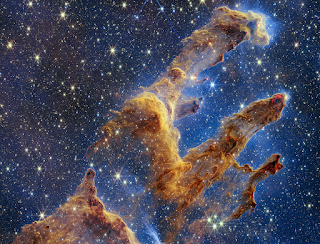ἐν ἀρχῇ ἦν ὁ λόγος, καὶ ὁ λόγος ἦν πρὸς τὸν θεόν, καὶ θεὸς ἦν ὁ λόγος.
I wonder if this verse, John 1:1, has perhaps been more debated than any other verse in the whole New Testament, maybe even in the whole Bible. The main debate is what the writer means when he calls Jesus "ὁ λόγος" or The Word. The word, "logos" has about as many meanings in Greek as the word "word" does in English. Think about all the ways we might use the word "word".
I gave my word that I would do it.
When you are ready, give me word.
Oh my word! What have you done now?
etc, etc.
A good ancient Greek dictionary will give a page of definitions for the word "logos." So, which one is the author using here?
I think the writer is giving clues in the text to let you know which definition he means. The first clue is the first two words. "ἐν ἀρχῇ" or "in the beginning". Those two words automatically conjure up Genesis 1:1, even for people who never read the Old Testament. We are clearly meant to remember the creation of the world here, and how did God create the world? He used words. "And God* said, Let there be light." (Gen1:3) John seems to be suggesting that, just as words were the creative instrument God used to create the world, Jesus was God's instrument for creating the world. "All things were made by him; and without him was not anything made that was made." (John 1:3)
This was a startling assertion for the time. Greeks and Romans were used to stories of demigods, men or women who had one divine parent and one mortal parent. Hercules, Perseus, Theseus, were all the result of a god mating with a mortal. Jews were used to stories about prophets who were the result of miraculous births, like Isaac, and Samuel. The difference here is that John isn’t suggesting that Jesus was like Hercules or Samuel. He is asserting that he is like Zeus or indeed, יהוה. He is not the offspring or creation of the creator god, he IS the creator god that has condescended to take on human form. I think it was a hard idea for people to wrap their minds around, even the Jews.
The other gospel writers recognize Jesus as the Messiah, the "anointed one" who was sent to save Israel, and as the "Son of God," the result of a mystical union between God, through the Holy Spirit, and Mary that resulted in a virgin giving birth. But I am not sure that Peter, during Jesus’ earthly ministry or maybe even afterward, would have thought of Jesus as the same being who created the Earth, sent the flood in the time of Noah, spoke to Moses from the burning bush, and appeared as a pillar of fire over the tabernacle. I wonder if in Peter’s mind, Jesus was Hercules instead of Zeus. I think Paul understood it, I think John came to understand it, but I am not so sure about the rest of the apostles. As I read through the New Testament again, I will watch for indications that I am wrong.
__________________________________
*It is interesting to note, that during the creation narrative God is called "אֱלֹהִים" or Elohim, not "יהוה" or Yahweh. The tetragrammaton name doesn't show up until Genesis 2 .




No comments:
Post a Comment